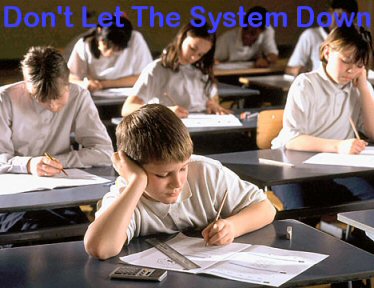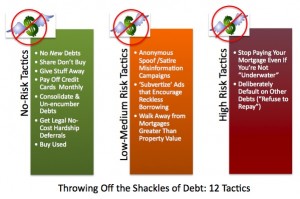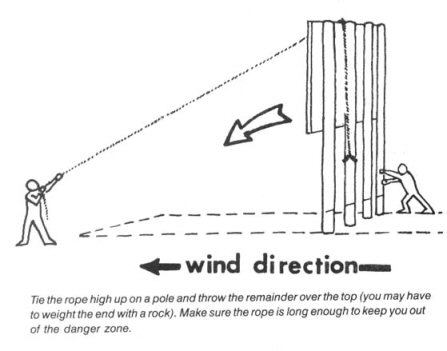
“Before school really starts to mould and shape you — and these days the assessment and unnatural selection begins just the other side of the cradle — you remain a primal being, attracted by the good earth.”
Andrew Collins, Where Did It All Go Right?
In a few week’s time we will be packed away and ready to move to Scotland. The timing is perhaps serendipitous, for at the beginning of May, in England alone of all the parts of Britain, approximately 300,000 children aged between 10 and 11 years will be sitting examinations in English and Mathematics. My younger daughter would have been sitting them too, had we not been moving to Scotland.
The aim of these examinations (these are not “tests” – they are sat under exam conditions) is ostensibly to assess the level of understanding that a child has of the subject being examined: given that knowledge in only two subjects is being assessed, this seems like a rather narrow view of what “education” means, but that’s not the worst of it.
It was while watching a fascinating television programme about the teaching of mathematics a few weeks ago, that I came across a phenomenon I had not experienced at first hand before: the dropping of virtually the entire school curriculum for 11 weeks in order to concentrate on passing SATs. When my elder daughter took her SATs last year — which also included science for the last time — the school sent home a few books for the children to read, and a few past papers were looked at, more for technique than anything else; yet, as I have since learnt, this is unusual. At this time of year, across England, schools are cramming students’ heads with probable exam questions, tips for passing using intelligent guessing, imposing additional targeted homework on children, and running “after school clubs” for those children who are on the borderline between grades.
And here the crux of the matter emerges: the schools (my younger child’s included from this year) are not running extra classes for the least able students, nor those likely to breeze through the exams – no, they are trying to ensure as many as possible get to Level 5. The statistics of most interest to parents of prospective students are the ones that show how many children achieved Level 5 in Year 6. Here is a vicious feedback loop working at full-tilt, for the more parents obsess with SATs results, the more the schools push the exams onto children as essential, and consequently the more the parents become obsessed by SATs results.
Have you any idea what this level of pressure does to the mind of a ten or eleven year old?
The Cambridge Primary Review, a four-year study covering all aspects of primary education in England had the following to say about SATs:
It is often claimed that national tests raise standards. At best their impact is oblique, says the Review. High stakes testing leads to ‘teaching to the test’ and even parents concentrate their attention on the areas being tested. It is this intensity of focus, and anxiety about the results and their consequences, which make the initial difference to test scores. But it does not last; for it is not testing which raises standards but good teaching.
Concern about stress levels is rife on parenting discussion groups; one such comment on Mumsnet was interesting, not only for highlighting the stress, but also raising a very interesting possibility:
The problem is not necessarily her academic progress, Her English is in the top 1/4 of the class and her maths is in the bottom half.
My concern is the stress that this will cause her. Worrying about them consumes her, and I’m worried that exam nerves will cause her to get a very bad mark in the exam, which will then destroy her confidence in her ability.
So the question is more to do with people who have experience of withdrawing their children from the test, is unauthorised absence the only way?
It seems odd to me that parents have the “right” not to have their children vaccinated but there does not seem to be a clear procedure for opting out of these potentially damaging tests
It is possible that the examinations may be boycotted by a large number of teachers in 2010, because of the disruption they cause to the curriculum in general. This would be a good thing for all concerned – except perhaps those head teachers and parents obsessed with getting “the best” for their children (or rather, their school’s reputations) – but in the event of the SATs not being put down with a terminal strike, there are quite a few things you can do to both remove the unnecessary levels of stress on your children, and also undermine the idea that “education” is about rote learning and cramming of useless facts.
Note: Although the text and actions specifically apply to the English school system, there is no reason they cannot be adapted to whatever part of the world and “educational” system you fall under. It is really just common sense.
Low Risk

Most children in Year 6 are being sent home with revision papers and given access to online resources in order to “brush up” on their technique. Why not spend that time with your child, learning how to grow food in the warming soil, or perhaps do some sewing, knitting or cooking as the sun goes down. Then again, you could play a game of cards, or just let them go out and have fun with their friends.
In summary: forget the revision homework and ignore the online tests. What’s the worst thing that could happen? Your child will get a mark that is based on their current ability – that is, if they sit the exams.
We had a great time last year purposefully ignoring the revision books – in fact we sent them back to the school in order to make the point that we had better things to do.
Medium Risk
If you are a teacher then anything rebellious you do, in such a high-pressure situation, may harm your career, so tread carefully if you value your pay packet; nevertheless, there are a couple of things you can do. The first is to ease up on the pressure; if not only for your sanity, but for the good health of the children you teach. Just because you have been told to drop lessons in order to concentrate on SATs it doesn’t mean you have to set mock exams or give extra homework – just teach the subject in hand, and if complaints are made the ideal response would be: “But surely it’s better to teach English / maths than to teach children how to pass exams.”
And you always have your union to fall back on; speaking of which, if your union does call for a SATs boycott, then you are in a much better position to not get involved in the SATs than if you had acted unilaterally (which is definitely a High Risk move).
As a parent, I believe you are within your rights not only to refuse SATs revision for your child, but also to refuse your child entry to the SATs exams themselves. Withdrawing from school entirely on the day(s) of the exams is – strictly speaking – illegal, although I would like to see this come up in court one day! Withdrawing because of an unexpected illness(!) may be another option, or maybe a special outing as described by the Anti SATs Alliance:
In some instances, groups of parents have made a further point by arranging educational visits or experiences on those days. This has always been as the result of getting together with other parents – usually starting with nothing more grand than a chat at the school gates.
Oh, and if you are a student who has the threat of SATs over your head (I like to think The Unsuitablog has a wide demographic) then there is no real reason that you have to put pressure on yourself. Take it easy; if you’re given a mock exam then do the minimum amount of work possible so as not to be noticed – life isn’t about exams, it’s about having a life.
High Risk

Whether you consider this High Risk or not depends on your attitude to Home or Community Schooling, but if you really want to make a statement about examinations, and the aims of the schooling system in general (turning children into nicely-rounded economic units ready for a life of wage slavery) then one strategic withdrawal will not be enough. Examinations are part of school life and, love them or loath them, if you attend a mainstream school then you will be taking exams, and the only way to avoid it is to not attend a mainstream school.
That’s a discussion for another day, but it is undoubtedly an option for quite a few people.
Finally – although with a bit of creativity I’m sure you will be able to think of more undermining actions – try a bit of concerted rebellion across the whole school; simply refuse to take the SATs as a group of parents and children. Go into school with a purpose, and make it clear that none of you want anything to do with SATs and that your children will not be sitting them, making clear the reasons for your refusal (see the introduction to this article). If the school insists that there is no way they can countenance this, or that supervision is not available so they have to take the exams, then withdraw the children from the school for the precise times the exams are taking place.
Of course, the risk you take is your decision, but one thing must always be clear: education is not about school, and it is certainly not about exams – it is about learning the skills and knowledge necessary for the future. The way things are going, that future is anything but certain, and there are some skills we will all be needing that you won’t find taught in any school…
(For more background information, read “The Problem With…Work” on The Earth Blog)
**UPDATE**
This, from The Observer, May 9 2010:
Thousands of primary schools will boycott national tests for 10 and 11-year-olds tomorrow, treating their pupils to class trips and lessons in creative writing instead.
Teaching unions have predicted that half of England’s 17,000 primaries will lock up their test papers in protest, affecting tens of thousands of pupils.
Some 600,000 pupils are due to sit the tests, known as Sats, in maths and English every day this week. Unions argue that the tests disrupt children’s learning and are “misused” to compile league tables, which they say humiliate and demean children and their schools.
Teachers said that in some parts of England, such as Calderdale, Hartlepool, Barnsley and the London boroughs of Tower Hamlets and Kensington and Chelsea, more than half of all primaries have refused to administer the tests.
A survey conducted by the Press Association shows that in 37 local authorities alone, an estimated 1,010 schools have already said they will be boycotting the tests. More are understood to be still considering what action to take.
In Kirklees, 83 out of 152 schools will take part in the boycott, while in Dudley 50 out of 79 will. Manchester city council said half of its primary schools – about 60 – will be taking action.
The unions said a letter from Ed Balls, the schools secretary, warning school governors that it was teachers’ statutory duty and professional responsibility to carry out the tests had backfired and spurred more teachers to join the boycott.
Both Labour and the Conservatives have insisted Sats should not be scrapped, although Labour has said the system is “not set in stone”, while both the Tories and Lib Dems have promised reform.
Headteachers from across the country told the Guardian they would use the boycott to take pupils on trips and have classes in subjects such as creative writing.
Teachers in London have organised a giant anti-Sats picnic near the London Eye. Its organiser, Sara Tomlinson, predicts at least 20 schools will bring their classes. The children’s author Alan Gibbons will tell stories and pupils will bring their favourite books.
Pupils at Bromstone primary in Broadstairs, Kent, will prepare for a local schools’ writing competition while 10 and 11-year-olds at Lindale primary in Cumbria will spend their week going on school trips and being taught orienteering. Children at Westfield junior school in Hinckley, Leicestershire, will visit Beaumanor Hall, a stately home used for military intelligence gathering in the second world war. Other schools said they would continue lessons as normal, but without any test preparation.
Christine Blower, general secretary of the National Union of Teachers, said: “We know that schools will be using the boycott as an opportunity to do things they wouldn’t normally have time to do, such as trips to museums and parks.”
Nigel Utton, headteacher of Bromstone primary, said Sats were “unbelievably unreliable”. “They are inaccurately marked, the quality of the questions is very poor indeed, they skew the curriculum horribly and they give unnecessary stress to the children. We already assess pupils ourselves.”
Michael Rosen, the former children’s laureate, told parenting site Mumsnet that Sats reduced children to machines and “units of productivity”.
In a question-and-answer session on the site, Rosen wrote: “I think we are obsessed by giving kids scores, measuring them and producing research that is based on statistics. This biometric approach to human behaviour is to my mind corrupting. It tries to reduce the variability in human behaviour. The difference between humans and machines is that with machines, you can keep all the variables in your test constant … you can’t do that with human beings.”
According to BBC News on Monday 10 May, something like 25% of schools in England due to take the tests, are not running them:
The data is not complete, but the councils which have given information cover 73% of England’s 17,000 primary schools.
Among the schools of which the BBC has details, nearly 1,900 (15%) say they will boycott the tests and about 5,650 say they will not (45%).
The councils say they do not know the situation in the remaining 40% of schools.














